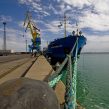
Kazakhstan Puts Components in Place for Caspian Shipping
Publication: Eurasia Daily Monitor Volume: 9 Issue: 145
By:

On July 25, Kazakhstan’s coastal city of Aktau hosted an expert-level conference on implementing global standards for maritime shipping at Caspian ports (News.az, July 25). Organized by TRACECA’s Logistics Processes and Motorways of the Sea (LOGMOS) project, the conference signals the inauguration of an important stage in the development of “New Silk Road” corridors from East and South Asia to Europe. As the European Union’s trans-Eurasian transport coordinating mechanism, TRACECA provides a regional forum and technical assistance for countless projects across the continent. However, while TRACECA can help on the margins, for a project to go forward, it requires political and financial commitment from host governments. For this reason, a number of LOGMOS projects have stalled, most notably the planned Turkmenbashi-Baku connection. But, the Aktau-Baku link seems to be moving ahead, with key managerial, logistical and technical issues addressed, to tackle one of the New Silk Road’s most vexing obstacles: the Caspian Sea
Kazakhstan’s Senate recently amended a number of regulations to allow for greater focus on Aktau as a Caspian shipping hub, logistically linked to overland transport routes across the length of the country (Kazinform, June 28). Referred to in the energy industry as “the Aberdeen of the Caspian,” the management of the port of Aktau will go to JSC “NC” Kazakhstan Temir Zholy (KTZ), the state railway operator, which also runs the “land port” of Khorgos on Kazakhstan’s border with China (see EDM, July 10). This centrally-coordinated management structure is to allow for more efficient transport of goods to and from the Caspian’s shores. KTZ’s involvement also fits in with Astana’s priorities of reducing low-level smuggling as an obstacle to trans-continental trade through Kazakhstan’s territory (Interfax, May 4, 2011). However, there has been some speculation that the management shift may have been precipitated by a drop in shipments through Aktau in the first two quarters of 2012 (Hellenic Shipping, July 5).
At the moment, the primary commodity shipped from Kazakhstan to Azerbaijan is oil from the former’s Caspian fields. The Kazakhstan Caspian Transportation System (KCTS), spearheaded by the country’s national energy company KazMunaiGas, is the outgrowth of agreements signed between the two countries in 2005 and 2009 to bring Kazakhstani oil to world markets through the Baku-Tbilisi-Ceyhan (BTC) pipeline. KCTS is in the process of being expanded to include not just oil discharge terminals and tankers, but a new pipeline from an oil treatment plant for the Kashagan field to the Caspian oil port at Kuryk. A new oil terminal is under construction there to provide for large 60,000-ton-deadweight (DWT) tanker vessels (KMG, July 30). Trans-Caspian oil shipments from Kazakhstan have not always been regular, due to production delays, mainly at Kashagan, and Russian pressure to favor routes through its territory. For both of these reasons, full implementation of KCTS, in which Azerbaijan’s state energy company SOCAR would be a co-investor, has been delayed. For Astana, this has partly led to increased interest in non-energy shipping across the Caspian. Kazakhstan Engineering’s recent MOU with South Korea’s STX Offshore and Shipbuilding Company, reflects this trend (Tengrinews, May 4).
One of the technical keys to increasing trans-Caspian shipping is full implementation of accommodations for roll-on, roll-off (Ro-Ro) capabilities at Aktau and Baku, not to mention other littoral ports. Ro-Ro shipping, in which a truck embarks in one port and disembarks in another, free to continue its overland journey without removing its container, is faster, easier to process and often cheaper. Higher value shipments often require Ro-Ro shipping arrangements, and it is exactly this sort of traffic that Kazakhstan seeks to boost across its territory. At the moment, Ro-Ro capabilities at Aktau are limited, with a historical focus on container traffic, but the July 25 LOGMOS conference focused on expanding Ro-Ro capabilities as a priority (News.az, July 25).
This was not just for trucks, but also for rail, under the auspices of the Silk Wind block train operation. While still very much notional, the ambitious project proposes a fully compatible rail link from China through Kazakhstan, across the Caspian to Azerbaijan, Georgia, Turkey and finally the European Union (Azerbaijan Business Center, July 25). While there are significant track gauge and customs hurdles along the way, the main challenge has always been the trans-Caspian portion. Should efficient Ro-Ro rail capabilities be implemented in Aktau and Baku ports, this challenge would largely be overcome.




